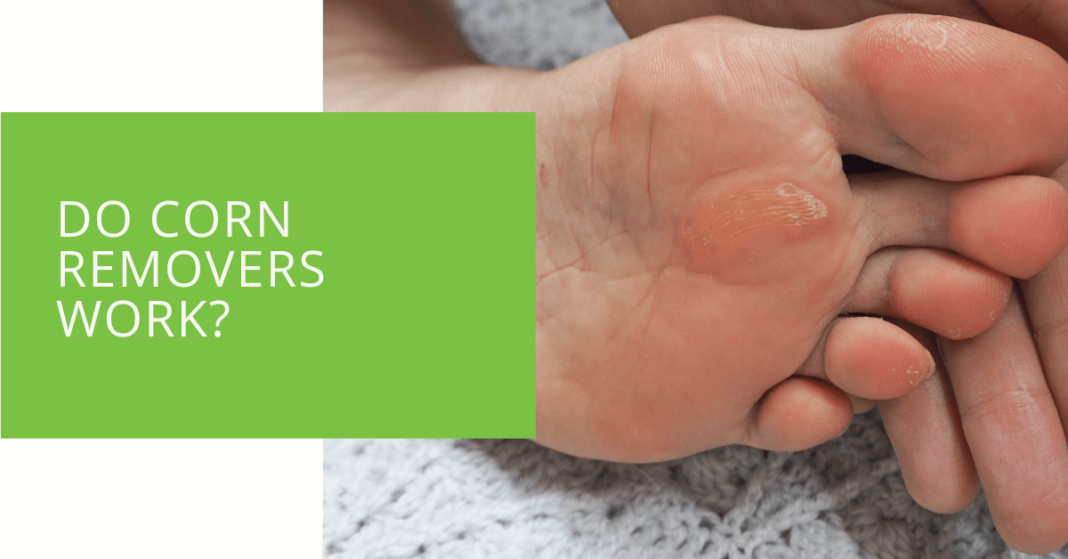Corns and calluses are common foot ailments that can cause discomfort and pain. Many people turn to corn removers as a solution, but do they work? In this comprehensive guide, we’ll explore the effectiveness of corn removers, their role in treating corns and calluses, alternative treatment options, and prevention tips.Key TakeawaysUnderstanding the difference between corns and calluses is crucial for effective treatment.While corn removers containing salicylic acid can be effective, it’s essential to consider proper application techniques and potential side effects.Consulting with a podiatrist at ePodiatrists can provide personalized advice and treatment options for managing corns and calluses.What Are Corns and Calluses?Definition of Corns and CallusesCorns and calluses are thickened areas of skin that develop in response to repeated friction or pressure. Corns typically occur on the tops and sides of toes, while calluses are found on the bottom of the feet or other areas that bear weight.Causes of Corns and CallusesIll-fitting footwearHigh heelsFoot deformitiesWalking abnormalitiesExcessive walking or runningPoorly cushioned shoesThe Role of Corn RemoversHow Corn Removers WorkCorn removers typically contain salicylic acid, which softens and breaks down the layers of dead skin that make up the corn or callus. This allows for easier removal of the thickened skin.Types of Corn RemoversOver-the-Counter Corn RemoversThese are readily available at pharmacies and drugstores without a prescription. They often come in the form of medicated pads or patches that are applied directly to the affected area.Prescription Corn RemoversSometimes, a podiatrist may prescribe stronger medication or treatment for severe or stubborn corns and calluses.Ingredients in Corn RemoversSalicylic acid is the most common active ingredient found in corn removers. It is a keratolytic agent that helps to dissolve the protein bonds that hold dead skin cells together, making it easier to remove thickened skin.Effectiveness of Corn RemoversWhile corn removers can be effective for some people, their effectiveness may vary depending on the individual and the severity of the corn or callus. Over-the-counter corn removers may relieve mild cases, but more severe cases may require professional treatment.Factors to Consider Before Using Corn RemoversSeverity of Corns and CallusesThe severity of the corn or callus will determine the appropriate course of treatment. Mild cases may respond well to over-the-counter remedies, while more severe cases may require professional intervention.Medical Conditions and AllergiesIt’s essential to consult with a podiatrist before using corn removers, especially if you have underlying medical conditions or allergies. Some individuals may be sensitive to the ingredients in corn removers or may have conditions that contraindicate their use.Proper Application TechniquesTo maximize the effectiveness of corn removers, it’s important to follow the manufacturer’s instructions carefully. This includes properly cleaning and drying the affected area before application and avoiding contact with healthy skin.Potential Side EffectsCommon side effects of corn removers may include skin irritation, redness, or burning. If you experience adverse reactions, discontinue use immediately and consult a healthcare professional.Alternatives to Corn RemoversHome Remedies for Corns and CallusesSoaking the feet in warm waterUse pumice stones or foot files to exfoliate thickened skin gentlyApplying moisturizers or emollients to keep the skin soft and hydratedWearing properly fitting footwear with adequate cushioning and supportProfessional Treatment OptionsPodiatric ConsultationA podiatrist can assess the corn’s or callus’s severity and recommend appropriate treatment options. This may include trimming the thickened skin, prescribing custom orthotics, or performing surgical procedures if necessary.Medical ProceduresIn some cases, medical procedures such as cryotherapy, laser therapy, or corticosteroid injections may be recommended to remove stubborn corns or calluses.Tips for Preventing Corns and CallusesProper Footwear SelectionChoose shoes that fit well and provide adequate cushioning and support. Avoid shoes with narrow-toe boxes or high heels, as these can increase pressure on the toes and contribute to the development of corns and calluses.Foot Care PracticesKeep the feet clean and dryMoisturize the skin regularly to prevent dryness and crackingTrim toenails straight across to prevent ingrown toenailsAvoid walking barefoot in public areas to reduce the risk of infectionRegular ExfoliationGently exfoliate the feet regularly to remove dead skin cells and prevent the buildup of thickened skin. This can be done using a pumice stone, foot scrub, or exfoliating foot mask.ConclusionCorn removers can be effective for treating mild to moderate corns and calluses, but they may not suit everyone. Considering the severity, any underlying medical conditions or allergies, and proper application techniques before using corn removers is important. Professional treatment from a podiatrist may be necessary for severe or stubborn cases. At ePodiatrists, we specialize in treating many foot conditions, including corns and calluses. Schedule an appointment with us today for expert care and personalized treatment options.
